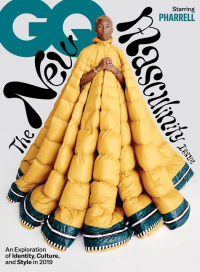In the future, we will look back at our barbaric 2020 selves and shake our heads at our unscientific, constructed, imposed and policed ideas on gender.
History will show that to bash little boys and girls over the heads, with pink and blue hammers, from the day they’re born, is not only laughable, it’s incredibly dangerous to us all.
Little boys are told, before they’re toddlers, to be a man – not just by mum and dad, but by their peers, teachers, sporting idols, gaming mates, all media, and the anonymous, angry male voices bellowing online.
It’s unavoidable. Be tough, strong, stoic, a hard, aggressive successful charismatic, emotionless leader.
Emotion, empathy, compassion, communication, joy, love – these are female traits.
No one wants be called a “girl”. What an insult
No one wants be called a “girl”. What an insult.
Yet these are all just human traits, nothing to do with our X and Y chromosomes.

Forcing boys into a blue box from the moment they open their eyes has resulted in a world-wide bloodbath of male suicide and domestic violence. And self-centred, avaricious, antagonistic, adversarial, must-win men are, quite literally, destroying the planet.
The clear science says we have but 30 years to turn our carbon emissions off if we are to avoid the encroaching seas forcing millions to relocate, and fight for diminishing resources. It’s going to be a living hell for those that survive.
Yet men, almost exclusively men, are happily making short term decision that are condemning billions to die.
“It’s MY coalmine, It’s MY shareholder’s profit. It’s MY property. Try to take it and I’ll fight you.”
‘Be a man’ thinking is going to eventually get us all killed if we don’t revolutionise our ideas on gender
‘Be a man’ thinking is going to eventually get us all killed if we don’t revolutionise our ideas on gender.
The numbers speak for themselves so must be repeated with painful regularity. Six men kill themselves every day in Australia, compared to two women. More than one woman a week is murdered by her partner or former partner. The grim count starts again at two, in this third week of January, 2020. In 2019, we hit the disgraceful number or 61.
Research from the Movember Foundation, late last year, says “risk factors that increase a man’s vulnerability to poor mental health and suicide include relationship breakdown, acute stress, persistent low mood and social isolation.”
The research, of 4,000 men globally, shows that while three-quarters said they had someone to talk to when they were feeling bad, two in every five men who had opened up to someone about their mental health said they regretted it.
They felt embarrassed and weak for speaking out, they felt they weren’t taken seriously and had lost respect.
More than half of men said they would not open up in such a vulnerable manner again.
Yet, at the same time, how society views masculinity is changing.
Travelling Australia for a year, talking about a positive masculinity, I’m more convinced than ever, that “being a bloke” is wreaking havoc in our lives. Everyone from country cops to weeping farmers are feeling it and seeing it with their own eyes.

There is an opportunity, right now, for men to be able to be their true selves, without pulling on the mask of masculinity; without fear of being ostracised for being a “pussy” or “gay”.
Even that bastion of sophisticated manhood, the GQ brand, (which I once published) knows the times are a-changing.
New editor-in-chief of British GQ, Will Welch, asked in the magazine’s The New Masculinity Issue: “How do you make a so-called men’s magazine in the thick of what has justifiably become the ‘Shut Up and Listen Moment’?”
GQ is now “actively engaging with the complex and shape-shifting inquiry around what masculinity means today”.
A traditional brand like GQ embracing this non-gendered future, is a clear sign that we are in the midst of a seismic cultural shift that’s just beginning to rumble.
On the last page of her horrifying must-read on domestic violence “See What You Made Me Do”, writer Jess Hill says helping men free themselves from the shackles of pretend masculinity is a “nation building” exercise, requiring a revolution.
We are, right now, at the start of a revolution of men that will set us all free.
Join us for our first in the 2020 BroadAgenda Public Talk Series – Emancipation of Men: Masculinity at Crossroads – featuring speakers Phil Barker, Jane Caro, Dr Michael Flood and Elise Stephenson, at Ann Harding Centre, University of Canberra on 13 February 5.30-7.30. Register here. See you there!




